Horses and their honesty, which sometimes translates to their inability to be polite, is energetically one of the things that differentiates horses from people and also from dogs. With horses, mostly what you see is what you get. But it takes time to know what you are looking at.
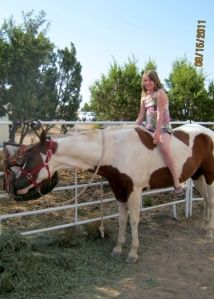
A horse who has been rigorously schooled in what can be referred to as a “conditioned response” way may anticipate what the rider or trainer wants, and just do it. Sometimes such a horse will not make good eye contact or will just seem like they are doing the activity by rote. They know their job and that’s that. Often when they have been schooled in some horsemanship methods, they will turn to face you after being run off, like in a round pen setting. That’s what they know.
In Liberty Foundations, we need to walk behind the horse just as other horses walk behind each each other to move them from place to place. This is a way horses establish order; we can do with them to teach them to recognize us humans as leaders. The horse turning to face you will get a little confused by this because of what he’s been taught to do in the past.
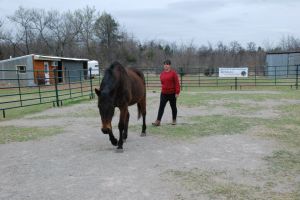
Once he recognizes the language of the horse in you, he will be happy to move off and let you walk him down from behind.
What is the difference between “conditioned response” and willing participation?
– In a conditioned response, the horse has been taught to do certain activities and will do them, just as children are taught to brush their teeth and put on pajamas even though they wouldn’t have chosen that activity themselves. There is no room for negotiation here. It is why the round pen is effective in horse training – because there is no where for the horse to go except around the perimeter of the round pen. The relief is to be asked to come into the center, because then the pressure is off.
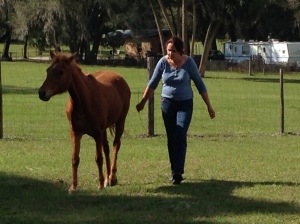
– In a willing participation situation, the horse knows he has choices in the matter at hand, whether he travels to the far end of the arena, turns right or left, ignores you or interacts with you, and this initially gives him a lot of space to decide for himself. Giving this freedom from the beginning allows you, the handler, to start shaping a relationship based on mutual respect and understanding. Ultimately, that horse will be more curious about what you might ask, and although he is not entirely free (being in some sort of corral or arena space usually), he has physical and mental space to make some decisions.
– In a conditioned response, there is the risk of building up pressure to certain situations in the horse . A horse that nips or kicks may be whacked and backed up, a popular technique used to get “bigger” with the horse as he got big with you. The horse may comply and behave, but may harbor some ugly feelings about it afterwards.
– In a willing participation situation, the horse is given the choice to behave better. The behavior such as biting or kicking is discouraged by replacing it with a positive option. This situation is something that engages the horse fully. Sometimes bodywork is necessary to determine if the horse is in particular pain such as around girthing or putting a bridle on, or some structural misalignment.

– Some conditioned response may be necessary in a completely unschooled horse that you need to interact with, and don’t have the resources to do liberty foundation training yet. This is true sometimes when I go to work with a horse that is rude or difficult in some way, and I’m not there to do liberty work with him. There is nowhere to let him go and do liberty, and that’s not the purpose of the call.
– To gain a willing participant in the above situation, I will work through the body and with my dimensions, on a cellular level, until I have the horse quiet. I’ll need to use the halter, body language and my own energy to manage the horse.
– A conditioned response such as “licking and chewing” is prized among dressage riders and bodyworkers, and probably some other professionals. This can be a conditioned response or it can be a true participatory response. Horses in the wild will do this after a particularly scary thing happens, sort a “whew,” it’s over with, when they are in a submissive role, or they want another horse or predator to think they are in a submissive role, and when they are relaxed. Once the performance horse learns this response is desired, he may lick and chew to receive praise so that the rider lets him off the hook.
– On the other hand, a willing participant will be engaged in the process with curiosity, and their responses – whether licking or chewing, blinking, head nod, neck stretching, will be authentic responses rather than attempts to avoid work or appease their owners. It is up to us to pay attention to the responses of horses and figure out what they are telling us at any given moment.
If we begin with the horse at liberty, then we can identify the conditioned responses in the beginning, and bring the horse to the place of being a more willing participant. We can watch the change in the horse’s facial expression, eyes, ears, and find out what he really likes to do. At liberty, we bring the horse beyond politeness to having an opinion of his own, and the conditioned responses will fall away. For awhile it may seem that our horse is a little more opinionated than we want, but at the same time, we’re learning so much about him! When that happens, I feel my heart soar!
I saw this happen with our gelding Patches. When he came to us, he was all conditioned responses as a therapeutic riding horse and former show horse. He did as he was told, until his physical problems caught up with him. But he also was highly stressed emotionally from doing exactly what humans wanted without much rest from it.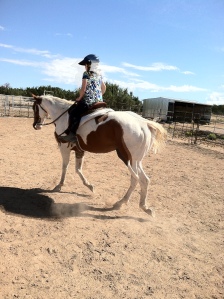
When he became a liberty trained horse, he had a million opinions all of a sudden and someone was listening to him! I think it went to his big head. But as he heals both emotionally and physically, I see joy in this big horse and I see it translate to everything he does. He is now kind of a comedian which I did not see when we first picked him and brought him home. He has progressed to enjoy other work besides liberty.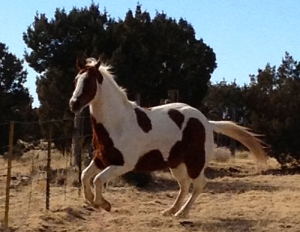
You might say, “Oh, I’m not sure I want a horse with so many opinions.”
But think of it another way: the horse with hidden fears and problems is an unknown quantity, and much more dangerous in the long run than a horse whose nature you see out front. The horse as a being, is honest, no matter what he does, but we are not always rocket scientists at figuring out what he’s doing and why. The more we can understand and reveal the true nature of the horse, the safer and happier we all will be…both horse and human.
Liberty Rein Practice with Patches – video. In this video, Patches knows what I would like him to do, but notice I give him space to go off on his own, in the shape of “pauses,” and he happily comes back to go over cavalettis with me.
[youtube https://www.youtube.com/watch?v=bYhYNmnVgu8&w=420&h=315]****
(copyright: Susan Smith, OrthoHorse)
Services: Bodywork (Ortho-Bionomy for people, Equine Ortho-Bionomy): private sessions, tutorials, phone consultations, distance healing communication and gift certificates
Some Don’t Like it Hot – These Liberty Coaching clinics will take place in the cooler morning hours over the summer. If you want to host a clinic in your area, contact me to make arrangements. Prices will vary according to location and travel. susansmith@orthohorse.info 505-501-2478
Liberty Coaching: clinics, mini-clinics, workshops, private and semi-private sessions, tutorials, consultations: by appointment: 505.501.2478 or emailing susansmith@orthohorse.info Scheduling now. Contact me for details.
I conducted a free Liberty Coaching Call on March 12. If you did not have a chance to listen, here is the link: http://www.susith.com/orthohorse/freehorseatlibcall.mp3
On the schedule for 2014:
This summer! Liberty Foundations/Trail Riding Clinic – Location & Date TBA!
Combining cumulative knowledge from over 18 years of endurance riding, Liberty Horsemanship and Ortho-Bionomy bodywork practice, Susan Smith brings a unique perspective to getting a horse and rider ready for the trail – in mind, body and spirit.
Liberty Foundation work is destined to deepen your trail experience.
Contact Susan Smith@ susansmith@orthohorse.info or 505-501-2478 for details.
Online class announcement to come! Stay Tuned….
September 27-28 – Spirit Horse Ranch Two-Day Liberty Foundations Clinic, Oklahoma City, Oklahoma – Engaging the Hearts and Minds of Horses. Susan Smith and Ruella Yates, co-teaching. Contact me or Ruella at 405-771-4274 (ruella@libertyfoundations.com)
December 13-14 – Horses at Liberty Weekend Clinic, DeLand, Florida – Bring your Horse into Deep Working Connection with Liberty Horsemanship. Instructor: Susan Smith. Contact Anne Daimler tdaimler@cfl.rr.com (386-822-4564) Susan at susansmith@orthohorse.info (505-983-2128 or cell 505-501-2478) 9:00-4:30 p.m.
Susan is a member of the Independent Liberty Trainers Network. libertytrainersnetwork.com/



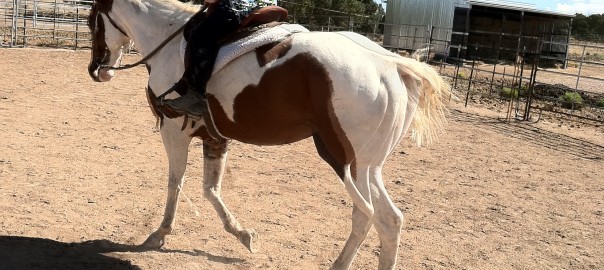
Really beautiful story of Patches and his saga of show horse, therapy horse, kids horse and your beloved partner. You’re right: If you want the truth, ask a horse!
Ruella Yates
Liberty Foundations trainer
Spirit Horse Ranch